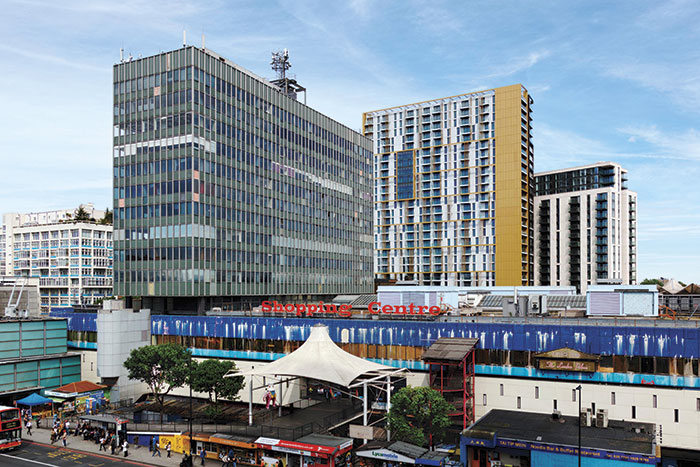
Elephant and Castle: redevelopment of the shopping centre has prompted outrage that public money is subsidising private gain Photo: Alamy
The night Colombia played England in the World Cup, Southwark Council’s planning committee met to decide on the redevelopment of Elephant and Castle shopping centre. Despite the match, the meeting was packed, fraught and went on for hours. The committee approved the scheme, narrowly, by four votes to three, with one abstention.
The shopping centre will now close in March 2019 and the mix of independent and multicultural traders expect to be replaced by something altogether more corporate. What is happening in Elephant is echoed by the sorry state of many of the UK’s high streets, and also by Network Rail’s sale by of its arches. The stock of reasonably priced premises for independent business continues to be depleted as public bodies prioritise a short-term return.
Two major concerns were raised about the Elephant and Castle development: firstly that it ignores the area’s residents and the small businesses housed in the shopping centre; and secondly that it puts profit before community.
Independent and multicultural traders expect to be replaced by something altogether more corporate
There has been much emphasis by the developers on the financial viability of their scheme. When an initial planning hearing in January 2018 forced a rethink of the small number of homes at social rents in the original plans – only 74 of 979 – this was raised to 116 and remodelled with the financial support of an £11.24m Greater London Authority grant. This grant was directly added to the private developer’s profit margin. The activist groups opposing the development were outraged by the use of taxpayers’ money to subsidise not home building, or affordable rent, but private profit.
This is not a development that will channel profits back into the local area and its people. At best Southwark must be hoping higher returns on rental units will provide an increase in retained business rates and council tax. If it does so, however, it will be at the expense of a thriving community of local independent shops and the provision of suitably mixed housing for the resident population.
At least the Elephant and Castle redevelopment has been part of an active planning process. The local community remained informed, and had a say. There was local and national press coverage of protests, and the developers had to change their plans at least somewhat to accommodate criticisms. Local councillors also voiced their concern. This would not generally be possible, or have much force. If a shopping centre was changing hands from one private asset management company to another, there would not usually be any need for those companies to alert local authorities to their transaction.
Take another example: the Palace Gardens Shopping Centre in Enfield was recently sold in an off-market transaction by the Standard Life UK Shopping Centre Trust to Deutsche Asset Management. This didn’t trouble the pages of the local newspapers, which were no doubt wholly unaware. There are no planning implications for the sale, so local people have no formal route to finding out that it has taken place, and local authorities have no pre-emptive right to play a more active role in the transfer of the asset. This is in contrast to many European countries, where municipal authorities have a say in all property transactions that directly affect their neighbourhoods. In France, for instance, every town hall has a pre-emptive right to purchase any asset put up for sale – under the Droit de Préemption Urbain – a right that they can exercise if they can make a clear case for the benefit of a municipal purchase to the local community.
In practice, this right is rarely exercised, not least because French communes typically have little free capital to invest in assets. Here, however, English authorities can access the Public Works Loans Board, have freedom to invest and the support of a network of social investors increasingly committed to place-based approaches.
Intelligent local investment secures the active participation of residents in the economic wellbeing of the place where they live and keeps a reasonable percentage of profits local
Other countries are following France’s lead. In September Barcelona approved a change to its General Metropolitan Plan giving the city council preferential purchase rights on land and buildings in large part to exercise greater control over housing development.
Active municipal investment like this has a range of advantages that could be applied to large-scale redevelopment projects such as the one at Elephant and Castle. It can support commercial projects that prioritise a different set of outcomes to maximising shareholder value. not least the patient and long-term commitment to creating and retaining local jobs, recycling profits into new ventures and committing to more renewable energy use. Here a positive revival of municipal economics merges with the simple practical necessity facing so many councils of finding creative means of securing income to deliver services.
Intelligent local investment also secures the active participation of residents in the economic wellbeing of the place where they live and keeps a reasonable percentage of profits local. It also gives local authorities more control than can ever be wielded through the regulatory powers of planning committees. Planning itself is a limited tool for evaluating the ongoing effects of urban schemes of this kind. Once planning has been approved, there is no continued oversight by the planning committee. What’s done is done, and control and profit have been ceded wholly into private hands. Active investment management could provide some of that continued oversight.
There are examples on which to draw. The Preston Model takes its inspiration from The Democracy Collaborative’s work in Cleveland, but this shouldn’t be allowed to dominate municipal investment models to the exclusion of every other potential approach. The Local Initiatives Support Corporation (LISC) founded by the Ford Foundation 35 years ago plays an active role as a Community Development Finance Institution (CDFI) with $18.6bn invested in projects throughout the US. Of particular relevance here is LISC’s Retail Initiative which offers a mix of grant and investment finance to retail projects in deprived US neighbourhoods. TRI is a for profit subsidiary of LISC, and offers market rate returns to its mix of investors. One of these long-term projects has been the joint financing of a shopping centre in New Haven in partnership with the Greater Dwight Development Corporation (GDDC). That project has successfully paid dividends to investors – of which LISC and GDDC are two – whilst at the same time having a cautious and appraising eye to local economic development and job creation.
This is the kind of role that many of the UK’s social investors already tacitly play in brokering finance deals for small and medium sized community organisations in partnership with local authorities. What Elephant and Castle shows, however, is the potential, and the need, for larger scale finance that secures town centres and their commercial developments in ways that focus far more clearly on the lives and livelihoods of local people. A TRI for England could do worse than start engaging the Standard Life UK Shopping Centre Trust. It has the right set of assets, and is already investing on behalf of local authority pension funds. There would be much to learn. There is certainly much to do, with projects crying out for a more sympathetic approach than Elephant and Castle.
While our international government investment arms have no qualms investing in shopping centres and malls across the world, isn’t it about time our local government took a leaf out of their book and invested on their doorstep?
This is an extended version of an article published in the November 2018 edition of PF.




















